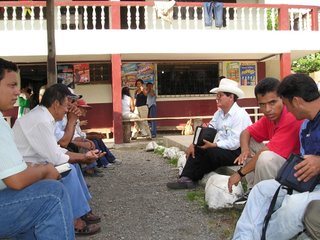 There was a time when Evangelicals took to the mission field a fairly standardized formula for communicating the gospel, using mainly verses from the book of Romans. “All have sinned…The wages of sin is death…But God shows His love toward us, in that while we were yet sinners, Christ died for us…” etc. which is all true and logical, but was not the apostles’ approach to witnessing...
There was a time when Evangelicals took to the mission field a fairly standardized formula for communicating the gospel, using mainly verses from the book of Romans. “All have sinned…The wages of sin is death…But God shows His love toward us, in that while we were yet sinners, Christ died for us…” etc. which is all true and logical, but was not the apostles’ approach to witnessing...Missionaries have found that a doctrinal approach to witnessing does not work well in non-Western cultures. The less they structure a standard form of witnessing, the better folks understand the message. The best way to spread the good news is simply to let believers tell spontaneously--with the Holy Spirit’s power promised by Christ in Acts 1:8--what Jesus did to save sinners and what He has done in their own lives.
In wide-spread church planting movements today, one observes four starkly evident facts about witnessing:
1) Nearly everyone who comes to Christ does so because of prayer for healing of a physical ailment in Jesus’ name. Someone in the family, or a close friend, has been cured or liberated from an evil spirit.
2) Nearly everyone who comes to Christ in a pioneer field does so through the influence of a new believer. New believers still have many unsaved friends and can talk with them about spiritual matters without hesitation.
3) Nearly everyone who comes to Christ in a church planting movement has done so together with family members and close friends. Their faith is not a private matter. God sees the family as a unit, and brings it to faith as a unit, as Acts 16:31 promises.
Westerners’ background in individualistic cultures, leads them to emphasize ‘personal’ faith and Jesus as “personal savior”, etc. This is not found in Scripture. (The word ‘personal’ once simply clarified that we are saved by our own faith and not by that of our parents, but in time came to mean ‘private,’ which devastates witnessing.)
4) Powerful conviction of sin is more frequent, and sinners find it easier to come to permanent, saving faith, in a group that is small enough to have spontaneous interaction, where believers practice the many ‘one another’ commands such as exhorting one another, teaching one another, correcting one another, confessing faults to one another, etc.
Guy,
ReplyDeleteThanks for posting this. I believe this is valuable and practical information for us all.
Just wondering... Have you found Point #1 to be true in relation to your situation there in Ecuador, and in specifically Baptist circles?
The book "Healing Evangelism," by Presbyterian Charismatic Don Dunkerley, is an interesting read in this regard. I do not completely agree with him on some of his more overtly Charismatic views, but if Point #1 above really is true, I don't see how we can avoid taking more serious consideration of this entire matter.
DAVID--I might not use as strong of language as "nearly everyone", but certainly many who are coming to Christ here in Ecuador do so because of prayer for healing of physical ailments. This shouldn't upset us, though. In Jesus own ministry, He did two things: heal the sick, proclaim the Kingdom. Why shouldn't we follow after His pattern as well? Pray for the sick to be healed in Jesus Name and then proclaim the Gospel to them!
ReplyDelete